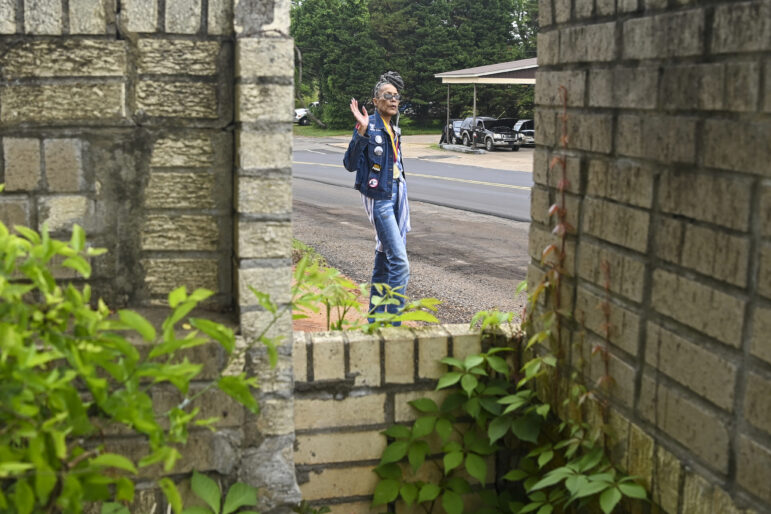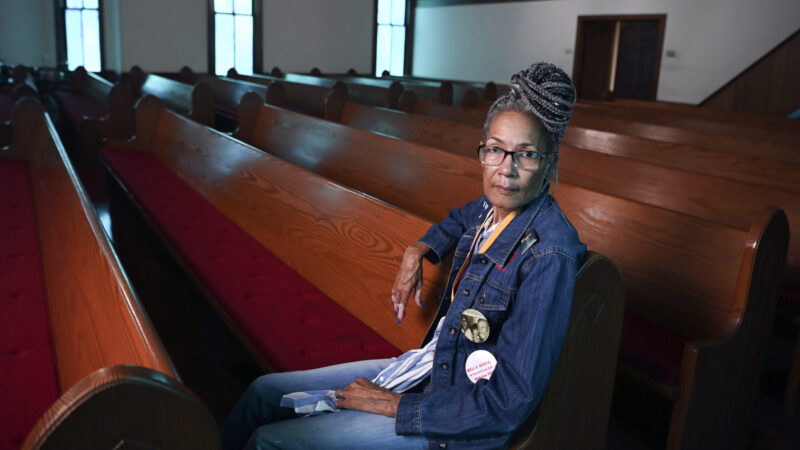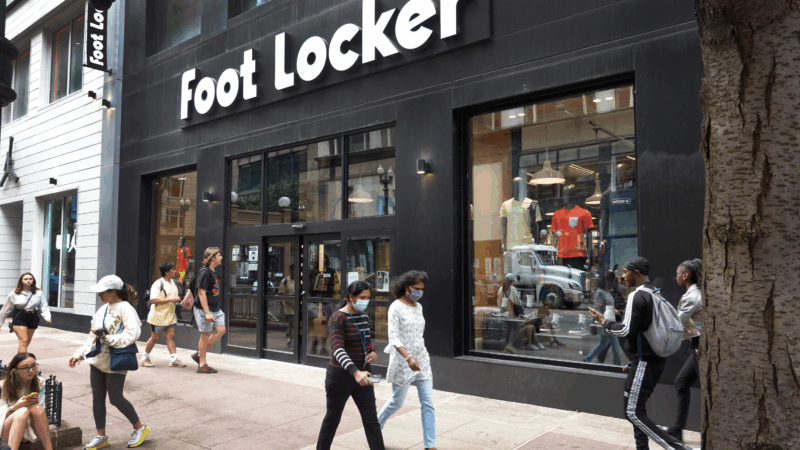Voting rights marcher recalls being clubbed, hearing fatal gunshot during pivotal day of protests
Civil Rights foot soldier Della Simpson Maynor poses for a photo on May 19, 2023, at Zion Church in Marion, Ala. On Feb. 18, 1965, the 14-year-old Maynor was part of a group planning to march to the Perry County jail where a local SCLC field secretary was being held for registering voters. State and local police met the protestors with violence just outside the church where Maynor was clubbed and heard the gunshots that fatally wounded activist Jimmie Lee Jackson.
By Kim Chandler and Gary Fields
MARION, Ala. (AP) — Della Simpson Maynor was just 14 when she marched for voting rights in her hometown of Marion, Alabama. Her most distinct memory of that evening is of the police attacking the demonstrators.
She recalls one officer, on horseback, swinging at her head with a club.
“I remember going up with my elbow, trying to protect my head,” she said, pointing to the place where the club cracked down on her arm. “They didn’t care who they hit — children, women. I remember a lady, she was pregnant.”
The Feb. 18, 1965, march ended with the shooting of a young activist and set in motion events that galvanized support for Congress passing the Voting Rights Act later that year.
The group had gathered to walk from Zion Methodist Church to the nearby jail to protest the arrest of James Orange, a leader in the civil rights movement. There was a rumor that white people in the town planned to lynch Orange that night to send a message.
Maynor had wiggled her way near the front of the line, but the group made it only a few hundred feet.
“All of a sudden there were police officers everywhere,” she said. “They just came out of the darkness.”
She remembers seeing a minister kneeling to pray.
“They told him to get up, unlawful assembly. You have to disperse. And of course he continued to pray. And that wasn’t good enough, so they hit him with that billy club,” she said. “I started to try to retreat, but it was too late because they had begun to rush us.”
Maynor ran and crouched beside the church, where she was found and hit. She and others fled into Mack’s Café, a restaurant that was part of a Black business district — the businesses on the town square were for whites only. A police officer came in and ordered them to leave.
Maynor then heard the sound of a gunshot. A local church deacon, Jimmie Lee Jackson, trying to protect his grandfather from police inside the cafe, was shot by a state trooper. He died eight days later.
Jackson’s death became the catalyst for a march the next month in Selma, when the participants were attacked by police as they tried to cross the Edmund Pettus Bridge. The day became known as “Bloody Sunday,” and images of the violence galvanized support for the passage of the Voting Rights Act later that year.
“It was after Jimmie’s death and all the attention that was brought to this area that they actually attempted to do something about the Voting Rights Act,” Maynor said.

At the time, she thought the struggle was over because, “we immediately started electing people of color to key positions in this town.”
But while events in Alabama helped give birth to the Voting Rights Act, court cases originating in the state have led to its steady erosion over the years.
A U.S. Supreme Court case arising from a suburban Alabama county ended the requirement for several states with a history of voting discrimination, mainly in the South, to get federal approval before changing election laws and procedures.
This summer, the court is expected to rule on whether the Voting Rights Act will be reinforced or further eroded in another case out of Alabama.
“I’ve seen a lot of change,” said Maynor, now 74. “But I’ve seen a lot of things exactly remain the same because the thinking hasn’t changed.”
While circumstances are vastly different nearly 60 years after the Voting Rights Act became law, Maynor sees echoes of the past. As a child, she attended segregated schools, waiting in the morning to catch an old bus while white children, riding a new one, would ride past her shouting racial slurs.
Today, white politicians are trying to put boundaries on how race and the civil rights era are taught in schools. The vast majority of people “that hold power and make the biggest decisions” in Alabama are white, she said.
“There’s a struggle that’s always had to be fought,” Maynor said. “You always hope the things you’ve done will make a difference in the long run, but to see where we are in this country (it’s) pretty much the same place we were in 1965, and we’re fighting the same battle.”
Charles Strouse, Broadway composer of ‘Annie’ and ‘Bye Bye Birdie,’ dies at 96
The Broadway composer of Annie and Bye Bye Birdie died Thursday at 96.
Who is Cassie? The stalled music career of the Sean Combs trial’s star witness
The mogul's former protégé and girlfriend emerged as a promising pop artist in 2006. On the stand this week, she said her relationship with Combs and his label quickly became more about control.
The 10 best songs of Eurovision 2025 — and their chances to win
The grand final of this year's Eurovision Song Contest takes place on Saturday, May 17, in Basel, Switzerland. It's an annual celebration of melody, rhythm, fabulousness and glitter.
Dick’s Sporting Goods is buying Foot Locker for $2.4 billion
Together, the two retailers will have to wade the choppy waters of new tariffs on imports, including footwear. And they'll face the growing competition from shoe brands selling directly to shoppers.
Denver air traffic controllers had 2-minute communications outage, FAA official says
The outage in Colorado comes amid increasing scrutiny on the nation's main aviation agency following outages at Newark Liberty International Airport in recent weeks.
DHS asks for 20,000 National Guard troops to assist in deportations
If approved, the move would be the first time Guard troops at the national level have been asked to assist in the removal of migrants in the U.S. without legal status.









